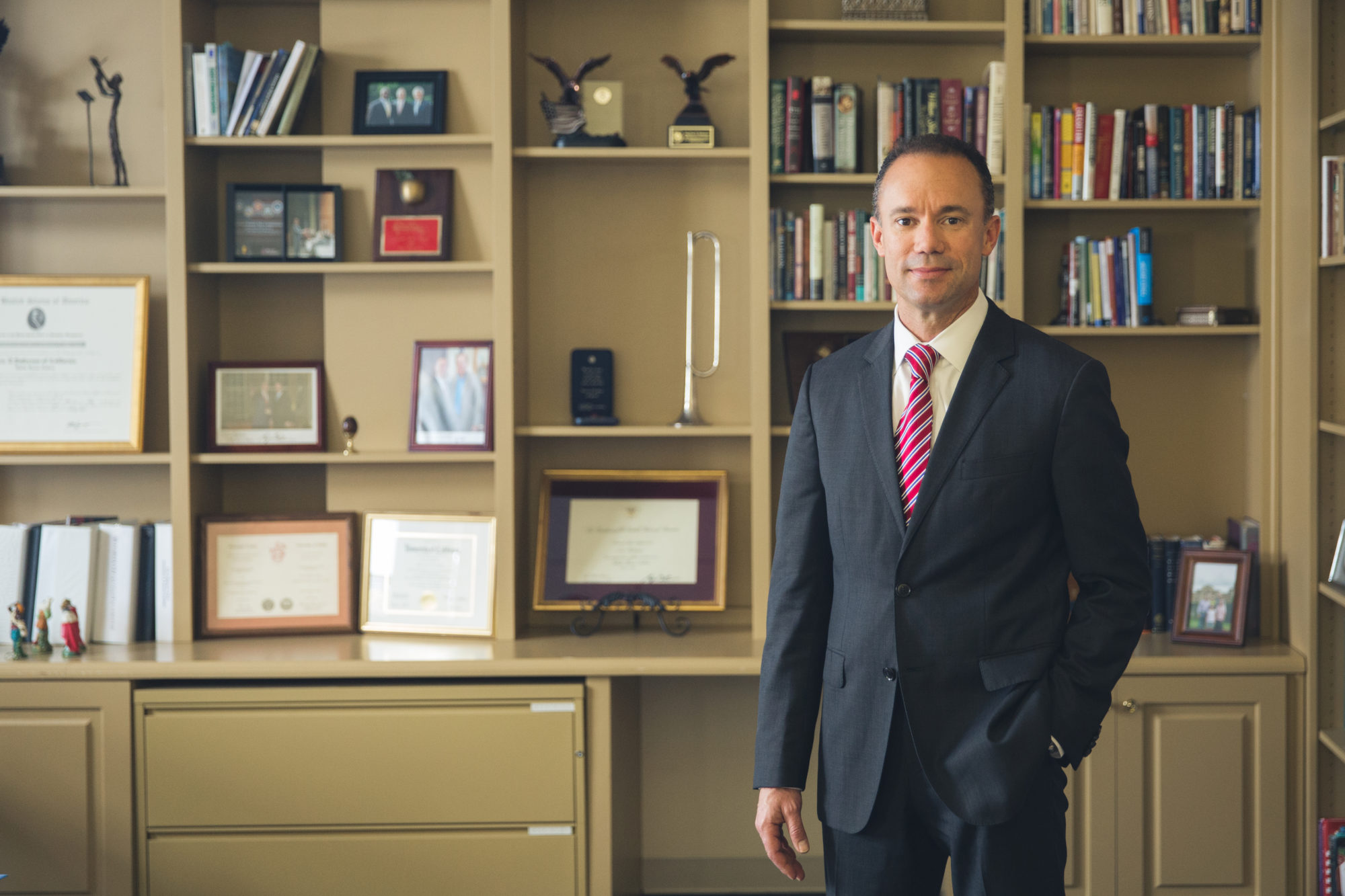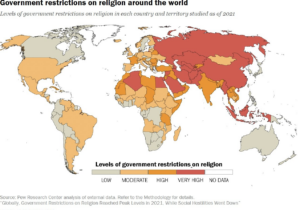In his interview with Mark Melton, Eric Patterson, executive vice president of the Religious Freedom Institute, speaks about religious violence, persecution, and conflict in Nigeria. This includes violence against Christians in the middle belt of Nigeria as well as violence by Muslim extremists against more moderate Muslims in the Northern regions of Nigeria. Patterson explains why Americans should be concerned about such conflict and how tensions could affect the wider region. He cites the civil wars in Rwanda and the Democratic Republic of Congo that destabilized their regions and led to the deaths of millions as well as the obligation that Christians have to stand in solidarity with those experiencing religious persecution, regardless of their tradition. Finally, Patterson lists some news sources that cover the conflict and makes suggestions as to what other countries people might monitor with respect to religious freedom.
His article on the topic can be found here.
Rough Transcript of the Conversation:
MELTON: Hello my name is Mark Melton, I am the managing editor here at Providence and I am joined today with Eric Patterson who is the executive vice president of the Religious Freedom Institute and a scholar at large at Regent University. And first off, thank you so much for coming in, or sitting down and speaking with us.
PATTERSON: A pleasure. It’s very nice to see you today Mark.
MELTON: Yes, so my first question is you’ve written for us about Nigeria and the situation there, so could you describe the situation in Nigeria and why Christians should be concerned about what’s going on there?
PATTERSON: Nigeria is a large, important country—it’s really the anchor of stability in West Africa. Over 200 million people, over 500 distinct dialects or language groups—although there are some specific large ethnic majorities like the Igbo, the Yoruba, the Hausa, that represent tens of millions of people. It is an economic powerhouse in the sense that it has rich oil reserves, and yet its inequalities and its social strife are very worrying.
And more specifically what’s been worrying are two religion and violence trends over the past decade or more. One is competition and strife, often led by Hausa or Hausa-Fulani tribesmen against Christians in the Middle Belt. And the second is Muslim on Muslim violence, largely in the north of the country, usually by extremists like Boko Haram or Islamic State in West Africa against more moderate Muslims. All of those things could lead to outright civil war or to the disintegration of Nigeria, like we saw with the Democratic Republic of Congo 20 years ago.
MELTON: And building on that, you mentioned that this can cause a huge regional problem. And so, could you describe how that could happen or how could the situation in Nigeria spiral out of control?
PATTERSON: Speaking from a security standpoint, think about what happened when Rwanda imploded in 1994 and the ramifications of that. Rwanda was a country, just a very small country in comparison, but what happened in that country—not only did you have close to a million deaths—800,000 deaths—due to a genocide that lasted only about three weeks—but you had the effects of that cross the borders in the neighborhood, cause destabilization in other countries, and ultimately the country the former Zaire—what’s today’s Democratic Republic of Congo—fell into a period where it had two civil wars that resulted in somewhere between two and three million deaths. It was a continental type of war. It was on the scale of World War II in a sense. It destabilized the entire region. Nigeria is a much bigger country and were it to fail, or for it to fall into civil war—which it has in the past in the 1960s for instance—it would send shockwaves across the entire region.
MELTON: Yeah, and I believe I’ve heard the war in Congo having been described as Africa’s world war. Because I think everyone from Libya, I think even South Africa – I’d have to double-check that—but yes, several African countries were involved in that, and a repeat of that in Nigeria would be awful. So why should Americans be worried about the problems over there?
PATTERSON: Americans should be concerned about this for a couple of reasons. First, we’ve had good relationships with Nigeria, with its political class or parts of its political class, both Christians and Muslims, for many years. Nigeria was a major oil exporter to the United States. From time to time our governments and militaries have done things together. I wouldn’t say that it’s a warm, fraternal, strategic relationship, but there’s been many good things there. Not just us but some of our allies like the Brits and the Germans have had good ties with Nigeria as well. So that relationship and the role that Nigeria plays as the anchor of West African security. In fact, in the past, Nigeria has been a leader in helping to bring security to some of its neighbors through its leadership in ECOWAS, which is the regional organization.
The second reason is that at really a person-to-person level, Nigeria is a highly religious country; it’s one of the most religious countries on the face of the earth. American Christians should be very concerned about the plight of everyone globally who are repressed or persecuted supposedly for religion’s sake. And that includes both terrorism and other types of violence. And so, we should be praying and standing in solidarity with the citizens of Nigeria who are literally being raped, pillaged, and plundered by extremists.
MELTON: Yeah. So, since Americans should be concerned about this, what news sources should Americans follow in order to get this. Because I know, when a terrorist attack happens in Paris, a lot of organizations already have journalists there to cover it. But when something happens in Nigeria, who should we turn to to understand what’s going on over there?
PATTERSON: Well it’s really true that American news does not do enough reporting on international affairs—at least not what comes across people’s main news feed or what they’re watching at the five o’clock news or something. For Christians in specific, things that would help them very much would be, for instance, to follow updates from groups like Open Doors, to follow updates from our organization, the Religious Freedom Institute. IRD, the parent of Providence. Faith McDonald, she is an Africa watcher with some specific expertise, particularly in North Africa, but she watches these things. CSW, Christian Solidarity Worldwide. These are a few of the Christian organizations. And from a news standpoint, it’s very helpful to see what World Magazine is providing. These are just a few of the resources that are out there that can help Christians to have a global sense of what’s happening for Christians worldwide, and specific places where Christians are persecuted.
MELTON: And I know you’ve mentioned how—and I think you alluded to this earlier—where Christians are being attacked—but you also have the moderate Muslims being attacked too in those same areas. Do you want to speak too for a second about what’s going on with all that?
PATTERSON: I sure would. On the one hand, what’s been worrying are increased attacks on Christians, including the burning of churches, and the targeting of clergy or people who are studying for the ministry. And we see that primarily in the Middle Belt; this has been happening every month for the last several months in Nigeria. And I cited that in a piece for Providence a few weeks ago. But what’s also very destabilizing—it’s been going on since 2009—are groups like Boko Haram, or now Islamic State in West Africa. These are groups that that are Islamist, they want to see every part of life taken to a very narrow code of ancient Islam, as they see it, similar to groups like al Qaeda or ISIS in Iraq. And what they’ve been doing for the past decade is killing moderate Imams, burning moderate mosques, and terrorizing their neighbors, both Sunni, but also the Shia minority. 25 percent of Nigeria’s Muslims are Shia, and they’re looked down on by their Sunni neighbors and there can be violence against them.
All of those dynamics are worrying because what they do is, they further radicalize populations. They cause vigilante types of justice; they make people arm themselves and fight back. And so, it’s a downward cycle of retribution and violence.
MELTON: Yeah, so what other countries should Christians keep an eye on? Because your organization obviously covers many issues. Which countries would you highlight for us to follow in addition to Nigeria?
PATTERSON: Well if we’re looking specifically at Christian persecution, we should be looking at the kinds of things that the US Commission on International Religious Freedom and the report released two weeks ago talk about or the United States Department of State’s Office of International Religious Freedom—they have a major report that will come out later this year that they update annually. Some of the gross violators are the obvious ones: North Korea, China, Iran, etc. I will note that a surprise was that the US Commission on International Religious Freedom took very seriously changes in Algeria and added them to a sort of watch list, a second-tier category that they have. So, watching what’s been going on in Algeria, which is largely politically motivated, that’s one that I don’t think many people watch.
Another is Russia. Russia is such a mixed bag in many ways, but Russia has been using its counterterrorism laws to sideline evangelicals or to bully evangelicals, but even more so other groups. The biggest group that has been attacked that way is Jehovah’s Witnesses. It’s something like eighty percent of the people who’ve been thrown in jail in the past few years under counterterrorism laws are Jehovah’s Witnesses. I realized that not all evangelicals or conservative Catholics are as concerned about Jehovah’s Witnesses, but we need to remember that religious persecution against any group sends a shockwave to other groups. And so, it’s always wrong. Coercive measures when it comes to religion are always wrong. And the question is, well if it’s the Jew today is it going to be the Christian tomorrow? If it’s their Jehovah’s Witness today is it going to be the Muslim tomorrow? If it’s the Muslim today, it’s going to be the Christian tomorrow. And certainly, we’ve seen that kind of bullying by the Russian state. And I don’t think Russia has to go that way. I think that there’s so many possibilities in Russia that it actually could embrace religious pluralism and religious freedom. That would be good for all citizens.
MELTON: Well, thank you so much for spending some time today, this morning, to speak with us about these issues and giving us some of these different countries. I know Russia has been—yeah like you said it’s an interesting case. Because I know a few years ago a lot of Christians were looking at Russia as being a Christian ally. And I think they were doing that because there’s a lot of overt Christian symbolism. But, underneath it, there is a lot of that coercion, especially like you said with the Jehovah’s Witnesses. So, thank you so much for taking the time and speaking with us about all these different issues.
PATTERSON: It’s my pleasure Mark. Best wishes.








 Sponsor a student for Christianity & National Security 2024
Sponsor a student for Christianity & National Security 2024